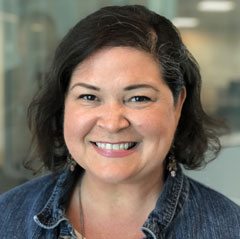Alumnus fights COVID-19 for residents of South Florida continuing care retirement community

Sep 09, 2020, 9:00 AM.
article key points
Shahid Ullah ’18 applies knowledge gained from his master of health services administration degree to help keep elderly safe during the coronavirus pandemic.
Like the flip of a switch, things had to change at John Knox Village of Florida to ensure its retired, elderly residents were safe. FIU alum Shahid Ullah, newly promoted to senior accountant in budgeting, had moved beyond his previous resident advocacy and operations role at the village to the finance department. This move didn’t lessen his duties, though, as he now needed to ensure the budget matched the day-to-day efforts he would help coordinate to combat COVID-19.
Stressful time
For Ullah, who also became a father in March, the stress was intense. He was fighting an invisible enemy ravaging nursing homes nationwide with alarming numbers of elderly victims. He was also concerned because the facilities were barred by the state from accepting new admissions. This reduced the revenue significantly. Every night he feared for his newborn baby girl, too. He felt the weight of his responsibilities, he says.
“Our staff was worried about losing their jobs due to the reduction in admissions, but we were able to figure out how to allow them to work enough hours, so no one lost their jobs. We were also able to contain the virus,” he reports.
Visitation policy
To preempt the spread of the virus, in February, his organization changed the visitation policy, anticipating the impact. This preemptive move helped John Knox Village remain free of COVID-19 patients until July. Only one resident became sick with COVID-19, and that resident contracted the virus outside the community while visiting a hospital for a procedure, he states.
One of the most difficult aspects for the residents has been the new visitation policy, states Ullah, who describes how staff members used technology to help keep residents connected to loved ones.
“We provided all of the technological tools and infrastructure needed so they could talk to their families. We had to set up Skype and FaceTime on their phones and computers,” he recalls.
In the meantime, a FEMA mobile testing lab came to the campus and did testing for employees and residents. The staff had to be checked every week and temperatures taken every day at the gate.
Preparation through education
All in all, it was a challenge preventing the virus from coming to the campus while not taking away basic rights for families and residents, describes Ullah, but his degree offered him the ability to create plans to respond to crisis situations as he worked with the finances.
“What prepared me the most was being able to make decisions in real time, responding to a spontaneous situation. We did a lot of simulations in my degree program and scenarios assigned by professors helped a lot on how to think outside the box and respond to a situation,” affirms Ullah.
Online learning
Online learning was the game changer for him, he says. He chose FIU’s hybrid master’s degree in health services administration—50 percent online and 50 percent face to face—to move into health services administration. Ullah had a finance background. This career change meant more studies, but he knew it would be worth it to obtain his American dream. He moved to Miami from Pakistan and started working for John Knox Village of Florida through an FIU-arranged internship.
“During my degree, had I been going to regular face-to-face classes, I would not have had time to give back to the community. I volunteered with a hospice care company,” explains Ullah, who has a fondness for working with the elderly—it reminds him of when he took care of his grandmothers in Pakistan.
“I like to work with elders. I helped both of my grandmothers. I was very close with them and they spoiled me a lot. I used to help them with the bank and take them to doctors’ appointments,” he recounts. “I didn’t think at the time, when I was 12-13 years old, that I would be working with geriatrics.”
Creative solutions
Tired from sleepless nights with worry and a new baby, Ullah is driven to keep the staff and residents safe. His degree program continues to help him every day because it covered a very broad spectrum of topics from leadership to operations management to creative thinking.
“At my job, every day you walk in, there is an opportunity to solve an issue—from staffing to scheduling, corrective actions, issues with kitchen sanitation, infection control and compliance” he lists.
These concerns are even more now with COVID-19, testing, disinfecting protocols, and lack of visitation, he explains. Everything has had to be reconsidered like touchless delivery, morale of employees, the isolation factor for residents, group activities like bingo, music and tai chi—exercise is outside now, and residents can listen to a loudspeaker while exercising on their balconies.
Hope and determination
Ullah is looking forward to good news of a vaccine but operates on a day-to-day basis. The focus is to keep residents and staff safe and keep the organization moving, he declares.
“We don’t know how it’s going to impact us in the long-run or when there will be new admissions or new residents,” Ullah admits. “COVID-19 was a very big surprise, one we anticipated, but it’s also been the greatest opportunity. I feel lucky to be part of such a big adventure; to be a part of the rescue team.”
